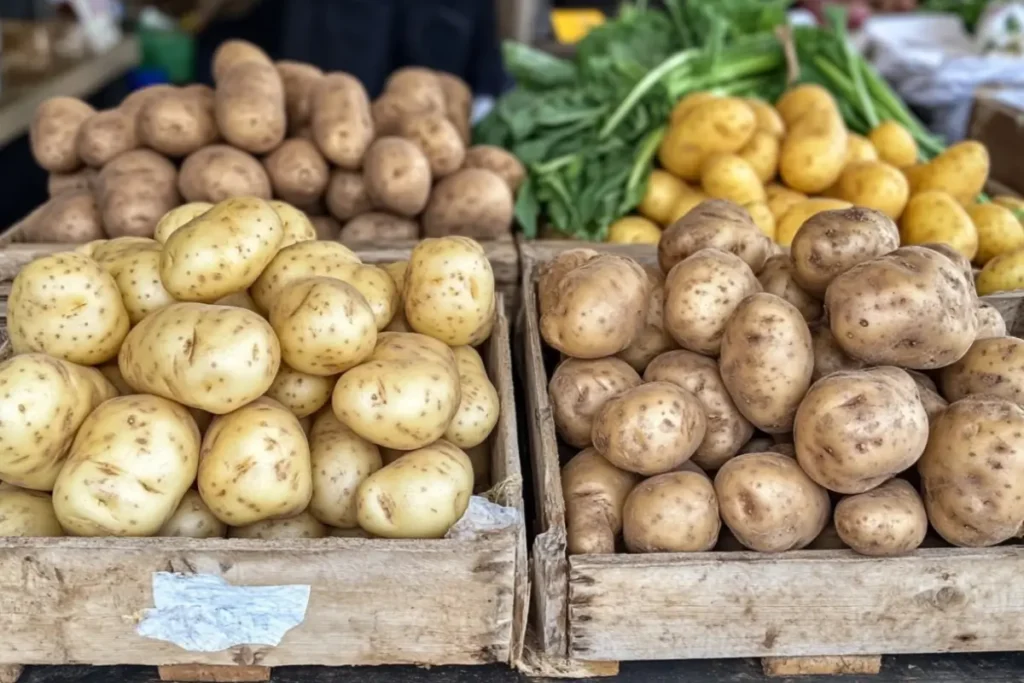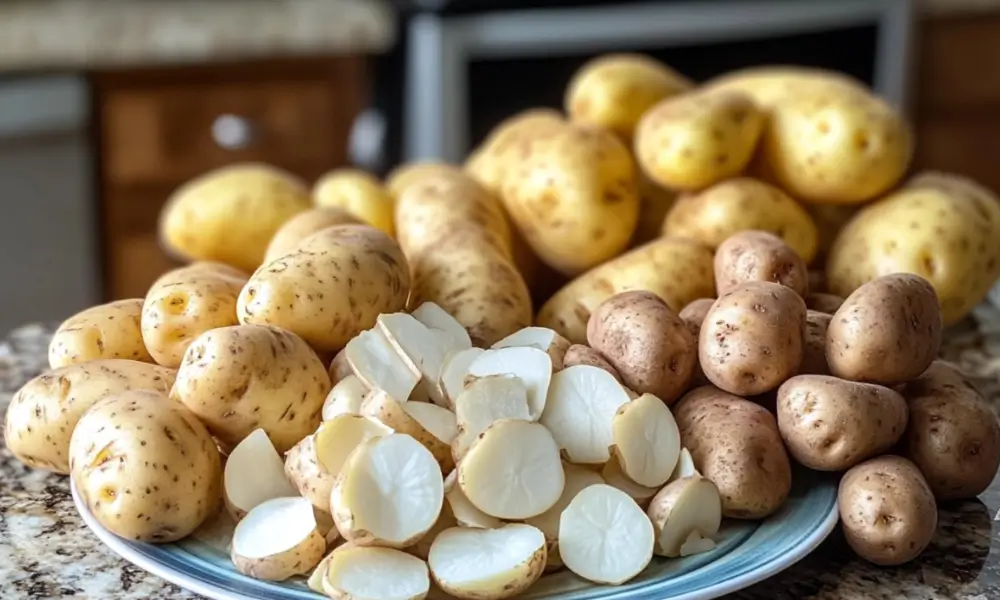Potatoes are a staple in kitchens worldwide, but not all potatoes are created equal. If you’ve ever wondered, “What is the difference between russet potatoes and Yukon Gold potatoes?” you’ve come to the right place. Both types, russet potatoes and Yukon Gold potatoes, are incredibly popular, but they shine in different ways when it comes to flavor, texture, and uses in the kitchen. Let’s dig in and explore russet potatoes and Yukon Gold potatoes in detail! 🥔
Introduction to Russet Potatoes and Yukon Gold Potatoes
When it comes to russet potatoes and Yukon Gold potatoes, knowing their differences will enhance your cooking experience.
Both russet potatoes and Yukon Gold potatoes bring unique qualities to the table, making them essential for different recipes.
Potatoes are like the superheroes of the vegetable world. Whether you’re baking, frying, or mashing, they can save the day. But before we start cooking, it’s essential to know the differences between these two heavy hitters: russet potatoes and Yukon Gold potatoes. Both are delicious, but understanding their unique qualities will help you pick the right one for your next recipe.
When cooking with russet potatoes, you’ll notice their fluffy texture makes them ideal for dishes that require a light consistency, whereas Yukon Gold potatoes lend a creamy richness to meals.
A Quick Overview of Russet Potatoes
Russet potatoes, also known as Idaho potatoes, are the classic, large, brown-skinned potatoes that most of us recognize. Their starchy texture makes them ideal for dishes like baked potatoes and French fries. When you cut into a russet, you’ll notice its flesh is bright white and fluffy. Think of it as the comfort food potato. These potatoes are also widely available, making them a common choice for everyday meals.
“Russet potatoes are your go-to for crispy fries and fluffy baked spuds. They’re like the reliable old friend who always comes through.”
One interesting fact about russet potatoes is their versatility. They’re not just great for fries and baking but can also be used in soups, stews, and even as a thickener in certain recipes. Their high starch content makes them an all-star for creating a creamy texture in blended dishes.
A Quick Overview of Yukon Gold Potatoes
Yukon Gold potatoes, on the other hand, are smaller and have a smooth, golden skin. Their flesh is buttery yellow, and they’re known for their rich, creamy texture. Yukon Golds are perfect for mashed potatoes, soups, and roasting. If russets are the comfort food potato, Yukon Golds are the gourmet option. These potatoes are often prized by chefs for their ability to elevate a dish with their luxurious texture and flavor.
Understanding the key differences between russet potatoes and Yukon Gold potatoes is crucial for any home cook.
Unlike russets, Yukon Gold potatoes hold their shape well during cooking. This makes them an excellent choice for potato salads or dishes where you want the potato to stay intact. They’re also fantastic for gratins and casseroles, where their creamy texture enhances the dish without overpowering it.
Both russet potatoes and Yukon Gold potatoes are versatile, but each excels in specific cooking methods.
Key Differences Between Russet and Yukon Gold Potatoes
Now that we’ve introduced the contenders, let’s compare them side by side.
Skin and Texture: A Visual Comparison
Russet potatoes have a thick, rough, and often dusty brown skin. This thick skin crisps up beautifully when baked, making it perfect for stuffed potatoes or potato skins. Yukon Gold potatoes, by contrast, have a thin, smooth, and waxy skin that doesn’t need peeling. That’s right—you can eat it as is! 🍠
Choosing the right potato, whether russet potatoes or Yukon Gold potatoes, can make a significant difference in your dishes.
The texture of these potatoes also differs significantly. While russets are known for their light and fluffy interior, Yukon Golds are celebrated for their dense and creamy consistency. This difference in texture is what makes each potato shine in specific recipes.
Flavor Profiles: Mild and Earthy vs. Buttery and Creamy
Here’s where the magic happens. Russets have a mild, earthy flavor that pairs well with butter, sour cream, and cheese. Yukon Golds, however, have a naturally buttery taste. Imagine biting into a potato that already tastes like it’s been slathered in butter—that’s a Yukon Gold for you!
Another key difference is how these potatoes absorb flavors. Russets tend to soak up sauces and seasonings, making them ideal for dishes where you want the potato to carry the flavor. Yukon Golds, on the other hand, have a rich flavor of their own, meaning they need fewer additional ingredients to taste amazing.
Cooking Applications: Which Potato is Best for Your Dish?
The biggest difference between russet potatoes and Yukon Gold potatoes lies in their cooking versatility:
- Russet Potatoes: Best for baking, frying, and mashing (if you’re looking for fluffy mashed potatoes). They’re also great for dishes like hash browns, where their starchy nature ensures a crispy finish.
- Yukon Gold Potatoes: Ideal for roasting, boiling, and creamy mashed potatoes. They hold their shape better, so they’re great for soups and stews too. They’re also a popular choice for making homemade gnocchi due to their lower starch content.
Nutritional Comparison: Russet Potatoes vs. Yukon Gold Potatoes
If you’re watching your diet, you might wonder which potato is the healthier option. Let’s take a look:
| Nutrition Fact | Russet Potatoes (1 medium) | Yukon Gold Potatoes (1 medium) |
|---|---|---|
| Calories | 168 | 120 |
| Carbohydrates | 37g | 26g |
| Fiber | 4g | 2g |
| Vitamin C | 14% | 20% |
| Potassium | 21% | 17% |
As you can see, russet potatoes are slightly higher in calories and carbs, while Yukon Gold potatoes pack a bit more vitamin C. Both russet potatoes and Yukon Gold potatoes are excellent sources of potassium, which helps maintain healthy blood pressure levels. Choosing between russet potatoes and Yukon Gold potatoes often comes down to your specific dietary needs or recipe requirements.
When considering russet potatoes or Yukon Gold potatoes, understanding their unique properties will help you make better choices.
Using russet potatoes gives a different experience compared to Yukon Gold potatoes.
Common Problems When Choosing Between These Potatoes
Ultimately, the choice between russet potatoes and Yukon Gold potatoes can define the success of your dish.

Let’s address some of the most common mistakes people make:
Choosing the Wrong Potato for a Recipe
Incorporating both russet potatoes and Yukon Gold potatoes into your meals can enhance flavor and texture.
Have you ever tried making French fries with Yukon Gold potatoes? While they’ll turn out okay, they won’t have that iconic crispy exterior you get with russets. Similarly, using russets in a creamy soup might leave you with a mushy mess. Always match the potato to the dish.
A great rule of thumb is to consider the texture and flavor you want in your final dish. Russets are for light, airy textures, while Yukon Golds bring a creamy, rich consistency.
Overcooking or Undercooking: Troubleshooting Texture Issues
Ever had potatoes that were either too hard or too mushy? Overcooking Yukon Golds can make them fall apart, while undercooking russets leaves them gritty and dry. Timing is everything, folks!
To avoid these pitfalls, always test your potatoes with a fork. They should be tender but not falling apart. And remember, the cooking method you choose will greatly affect the texture of the final dish.
Discover the buttery magic of Yukon Gold potatoes and russet potatoes or add a pop of color with nutrient-packed Purple Sweet Potatoes. Perfect companions for your potato adventures!
Here are some pro tips to ensure perfect potatoes every time:
Perfect Baking Techniques for Russet Potatoes
Preheat your oven to 400°F (200°C). Prick the potatoes with a fork, rub them with olive oil and salt, and bake directly on the oven rack for an hour. The result? Crispy skin and fluffy insides.
For an extra touch, try topping your baked russets with a dollop of sour cream, shredded cheese, and chopped chives. It’s a simple way to elevate this humble potato into a restaurant-quality dish.
Best Boiling Methods for Yukon Gold Potatoes
Place Yukon Golds in a pot, cover them with cold water, and add a pinch of salt. Bring to a boil, then reduce to a simmer. Cook for 15-20 minutes, and you’ve got the perfect base for mashed potatoes or potato salad.
If you want to enhance their flavor, try boiling them in chicken or vegetable broth instead of plain water. This simple trick infuses the potatoes with a depth of flavor that’s hard to beat.
Popular Recipes Featuring Russet Potatoes
Russet potatoes are a kitchen staple, known for their starchy texture and versatility. They work wonders in dishes that require a crispy finish or a fluffy interior. Here are some mouthwatering recipes that highlight the best of russets:
Classic Baked Potatoes with Toppings
Baked potatoes are a timeless favorite. To achieve the perfect baked potato, preheat your oven to 400°F (200°C). Scrub the russets clean, pierce them with a fork, and rub them with olive oil and a sprinkle of sea salt. Bake them for about an hour until they’re tender and the skins are crisp. Once done, slice them open and pile on your favorite toppings. Sour cream, shredded cheese, crispy bacon bits, and chives are classic choices, but the possibilities are endless. Have you tried adding chili or sautéed mushrooms? Game-changer! 🌟
Crispy French Fries: The Russet Way
There’s nothing quite like homemade French fries. Russets are ideal for this because their high starch content ensures a crispy exterior and soft interior. Cut the potatoes into thin strips, soak them in cold water for 30 minutes to remove excess starch, and pat them dry. Fry them in hot oil (about 350°F or 175°C) until golden brown. Sprinkle with salt immediately after frying, and you’ll have fries that rival any fast-food joint. Want to take it up a notch? Toss them in garlic butter or Parmesan cheese for a gourmet twist.
Hearty Mashed Potatoes
Russets shine in mashed potato recipes, especially if you’re aiming for that fluffy, cloud-like texture. Peel and cube the potatoes, then boil them in salted water until tender. Drain and mash them with butter, milk, and a pinch of salt. For extra creaminess, add a dollop of sour cream or cream cheese. These mashed potatoes pair perfectly with gravies, stews, or roasted meats.
Popular Recipes Featuring Yukon Gold Potatoes
Yukon Gold potatoes bring a rich, buttery flavor to any dish, making them a favorite among home cooks and chefs alike. Their creamy texture and golden color make every recipe visually appealing and delicious. Here are some must-try recipes featuring Yukon Golds:
Creamy Mashed Yukon Gold Potatoes
Yukon Gold potatoes are the gold standard for creamy mashed potatoes. Unlike russets, you don’t need to peel them unless you prefer a super-smooth texture. Their thin skins add a lovely rustic touch. Boil the potatoes until tender, then mash them with butter and heavy cream. A pinch of garlic powder or a drizzle of truffle oil can elevate this dish to gourmet levels. These mashed potatoes are the ultimate comfort food and a perfect side for any meal.
Yukon Gold Potato Gratin
Potato gratin is a luxurious dish that’s surprisingly simple to make. Thinly slice Yukon Golds and layer them in a baking dish with cream, garlic, and shredded cheese (Gruyère works beautifully). Bake at 375°F (190°C) for about an hour, until the potatoes are tender and the top is golden and bubbling. This dish is a showstopper at dinner parties or holiday feasts.
Roasted Yukon Gold Potatoes
Roasting brings out the natural sweetness of Yukon Golds. Cut them into bite-sized pieces, toss with olive oil, salt, pepper, and your favorite herbs (rosemary and thyme are classics), and roast at 425°F (220°C) for 30-40 minutes. The result? Crispy edges and creamy centers that are utterly addictive. These roasted potatoes make an excellent side dish for chicken, fish, or steak.
When to Use Russet Potatoes vs. Yukon Gold Potatoes
Knowing when to use russet potatoes versus Yukon Golds can make or break a dish. Each type has strengths that shine in different culinary applications. Here’s a quick guide to help you decide:
Best Uses for Russet Potatoes in Everyday Cooking
Russet potatoes are the MVP for dishes that require a fluffy texture or crispy finish. Here are some scenarios where russets are the clear winner:
- Baking: Their thick skin crisps up beautifully while the interior stays light and fluffy.
- Frying: From French fries to hash browns, russets deliver that satisfying crunch.
- Mashing: Perfect for light and airy mashed potatoes, especially when paired with butter and cream.
- Stuffing: Their large size and sturdy skin make them ideal for loaded baked potatoes.
Ideal Dishes for Yukon Gold Potatoes
Yukon Gold potatoes excel in recipes where a creamy texture and rich flavor are key. Here’s when to reach for Yukon Golds:
- Roasting: Their thin skin crisps up while the interior remains tender and flavorful.
- Boiling: Perfect for potato salads or soups, as they hold their shape well.
- Gratin: Their buttery flavor enhances layered dishes like au gratin potatoes.
- Gnocchi: Yukon Golds’ lower starch content makes them a great choice for pillowy gnocchi.
Frequently Asked Questions
Still have questions? Here are some common queries about russet and Yukon Gold potatoes:
Can I Substitute Yukon Gold for Russet Potatoes?
Yes, but with caveats. While Yukon Golds can work in place of russets in some recipes, their creamy texture might not yield the same results. For example, Yukon Golds won’t give you the crispy fries or fluffy baked potatoes that russets are known for.
Which Potato is Better for Mash?
It depends on your preference! If you like light and fluffy mashed potatoes, go for russets. If you prefer creamy and rich, Yukon Golds are your best bet.
Are Yukon Gold Potatoes Good for Frying?
While they can be fried, Yukon Golds don’t achieve the same level of crispiness as russets. They’re better suited for roasting or boiling.
Explore More Potato Perfection
Discover the buttery magic of Yukon Gold Potatoes or add a pop of color with nutrient-packed Purple Sweet Potatoes. Perfect companions for your potato adventures!
Final Thoughts: Choosing the Right Potato for Every Meal
So, what is the difference between russet potatoes and Yukon Gold potatoes? It boils down to texture, flavor, and cooking applications. Russets are your go-to for crispy fries, fluffy baked potatoes, and airy mash. Yukon Golds shine in creamy mashed potatoes, gratins, and roasted dishes. Knowing which potato to use can elevate your cooking and help you create unforgettable meals. 🥔✨


